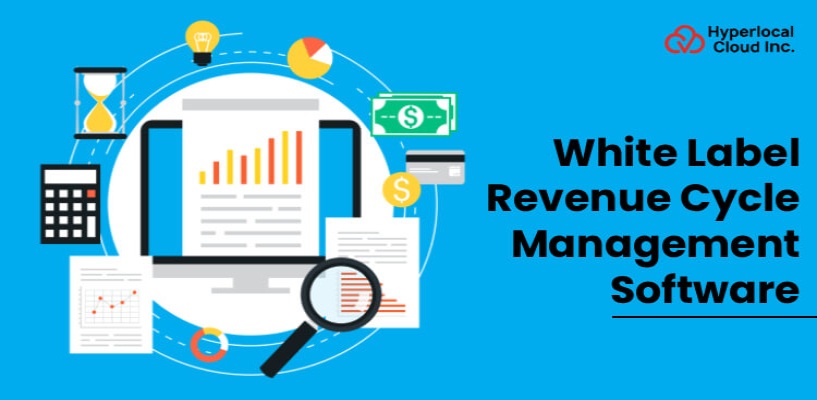White Label Revenue Cycle Management Software Solution

In the health care system, revenue cycle management (RCM) is important for the economic health of medical practices, hospitals, and other health professionals. With increasing complexity in invoicing, requirements processing, reimbursement, and rules, health organizations should follow the income cycle to ensure operational efficiency and financial success. This is the place where the revenue cycle management software (RCMS) plays an important role.
Over the years, the demand for RCM solutions has increased due to their ability to automate and optimize different stages of the income cycle. From patient registration to submission and payment of requirements, these software systems help to reduce errors, improve the income collection time, and ensure compliance with sometimes-changing rules. The market is growing rapidly for RCM software, with progress in technology, increasing cost-effective solutions, and changes in value-based care.
Understand What is Revenue Cycle Management Software
Revenue cycle management software refers to a set of devices and systems designed to streamline and automate processes involved in the management of the revenue cycle of a health organization. The income cycle includes everything from the intake of the patient to invoicing and final payment collection. Essentially, RCM ensures that health professionals are paid for the services they offer.
RCM software integrates multiple stages of the process, which typically include:
- Patient Registration
- Eligibility Verification
- Claims Processing
- Coding and Billing
- Payment Posting
- Denial Management
- Accounts Receivable Management
Ready to Improve Your Revenue Cycle?
How Does the Revenue Cycle Management Software Work?
The revenue cycle management software works to effectively facilitate the healthcare industry with technological advancements. Here, you will get a complete breakdown of how the software works efficiently.
1. Patient Intake and Data Entry
When a patient first visits health care professionals, the RCM software collects individual and insurance information. This is important to confirm the qualification, look for active insurance coverage, and to get the patient’s details in the system accurately.
2. Insurance Verification
RCM software automatically confirms whether the patient’s insurance is active and whether it will cover the necessary medical services. This requirement can reduce rejection and ensure a steady billing process.
3. Coding and Documentation
Medical coding is required to process insurance requirements properly. RCM software helps health professionals choose the right code for procedures, diagnoses, and treatments, ensure compliance, and ensure accurate reimbursement.
4. Claims Submission and Follow-Up
After coding once, the software claims and submits to insurance providers. It automatically traces claims and follows any pending payment or rejection.
5. Denial Management
If an insurance requirement is denied, the software flags it for further investigation. The system provides information on why the claim was rejected and proposes the necessary improvement to resume.
6. Payment Posting and Reconciliation
When payment is received from insurance companies or patients, the RCM software posts these payments on the correct accounts and tracks them for nonconformities.
7. Accounts Receivable Management
Software helps health organizations monitor payments and manage excellent balance by providing reminders for overdue bills. This helps to speed up the income cycle and ensure timely payment collections.
Comprehensive Pros of Creating a Revenue Cycle Management Platform
Businesses that are looking to invest in the white label revenue cycle management platform get a wide number of advantages. A brief detail for the same is precisely discussed below.
1. Branding Flexibility
One of the main advantages of white label solutions is that businesses can build the software under their own brand name. This enables businesses to launch the software in the market in order to build brand recognition and customer loyalty without developing a solution from scratch.
2. Cost-Effective
Developing your own RCM software solution can be time-consuming and expensive. A white label platform offers a cost-effective alternative, as it allows you to use a ready-made, tested, and detected solution while saving on growth and operating costs.
3. Quick Go-To-Market
With the white label RCM platform, you can quickly start the product without having to go through development and test steps. This means that you can soon start serving customers faster and start generating revenue.
4. Customization
White label RCM platforms often provide customization options that are usually scalable, which means they can grow with your business as you expand the customer base.
5. Reduced Risk
Since the white label platform has already been developed and tested, the risk of technical failure, errors, or incorrectness is low.
Features and Functionalities of Revenue Cycle Management Software
A lot of features come with the revenue cycle management software, of which the relevant ones are mentioned below. Just have a look at the following:
1. Patient Data Collection
Software captures important information such as personal information, insurance information, and medical history. This feature ensures that all relevant patients are recorded exactly from the first point of data contact.
2. Insurance Eligibility Verification
The software allows probability checks with the insurance company and ensures that the patient’s insurance is valid and includes the services they apply for. It reduces the risk of refusal to claim later in this process.
3. Automated Patient Registration
With this, patients can register through a secure online portal, update their personal and insurance information before the agreement, reduce the waiting time, and improve workflows.
4. Automated Claims Generation
When the service is provided, the software automatically generates claims based on the correct medical code and ensures accuracy and compliance.
5. Claim Submission to Payers
The software is integrated with insurance providers, so that spontaneous electronic requirements can be present, which speeds up the invoicing process and reduces errors.
6. Claim Tracking
The RCM software tracks the position of each real-time requirement, from the deposit to the deposit, and informs users of any deviations or rejections.
7. Denial Management
The software has been identified and the flag denied claims, offering action-rich insights and proposing to appeal or correct the claim to resume.
8. Medical Code Integration
The RCM software uses automated coding systems to ensure that the services provided are accurately specified in the requirements. This reduces errors and ensures compliance with industry standards.
9. Billing Integration
The software handles the entire invoicing process, from calculating the patient’s responsibilities to generating bills and tracking payments.
10. Customizable Billing Plans
Many RCM platforms allow the construction of adaptable billing schemes, including payment schemes for patients who may not be able to make full payment immediately.
11. Payment Posting
The software automatically adds payments from insurance companies or patients. This updates the position of each requirement and ensures that the payment amount is used in patient accounts correctly.
12. Integrated Payment Processing
The software calculation makes it possible to integrate the gateway, enabling patients to pay online bills, increase cash flow, and improve collection rates.
13. Performance Dashboards
Visual dashboards provide a real-time view of important data such as requirements status, aging, and payment collections, and decision makers help the manufacturers understand the organization’s financial health.
14. Data Analytics for Process Improvement
Using historical data, the software identifies the trends, bottlenecks, or recurrent problems, and provides actions to improve operational efficiency and income collection.
15. Audit Trails
RCM Software has a full audit track, which records any action and change in the system. This feature ensures transparency and helps in the case of auditing or legal examination.
16. Secure Data Encryption
All sensitive economic and patient data are encrypted, providing an extra layer of protection against cyber hazards and data violations.
17. Automated Notifications
The software automatically sends a reminder to patients on appointments, payments, and outstanding balances through text, email, or voice messages.
18. Patient Portal
Software provides an online portal where patients can see their bills, pay, update their personal information, and communicate with health care professionals, all in the same place.
19. Self-Service Features
Patients can handle their health information, see the results of the test, and present the insurance requirements through the user-friendly interfaces, improving the patient’s experience and satisfaction.
Build Your Brand with Our Customizable RCM Software Solution
Launch a Revenue Cycle Management Software with a White Label Solution
Numerous steps are involved, which can help you to launch a revenue cycle management software by utilizing white label solutions. Go through with a step-by-step guide mentioned below.
1. Choose a Reputable White Label Provider
The first step in launching an RCM software is to work with a reliable white label solution provider that offers a fully developed RCM platform. Make sure the supplier has a proven merit list in health technology and provides strong, adaptable software that meets your business needs.
2. Customization and Branding
The white label solution should be allowed for extensive adjustment, including logo, brand colors, and all other company-specific branding. This will enable you to market the product under your name. The user interface (UI) must also be optimized to meet the requirements and preferences of your target audience by providing a simple user experience.
3. Integrate with Existing Healthcare Systems
White label RCM software should be integrated with other important healthcare systems, such as EHR, practice management software, and insurance provider networks. The integration ensures a smooth data flow between the system, reduces errors, and streamlines operations.
4. Test and Ensure Compliance
Before going to the market, the software is tested completely to ensure that it is free of errors and features. It is necessary to comply with regulatory standards such as HIPAA or other local health services. The overall purpose of the platform is to ensure test integration, data security facilities, and a smooth launch.
5. Launch and Market the Solution
When the software is ready and customized, it’s time to launch it. You can offer free testing to attract users. In a post-launch offer, customer support and training are provided to help users get the most benefit from the software.
6. Ongoing Maintenance
Businesses need to ensure that regular software updates, security updates, and functional improvements are continuously distributed to the platforms to keep them updated with changes in the industry and customer needs.
Who Can Avail the Revenue Cycle Management Software?
There are several industries that can be positively impacted by the revenue cycle management software. The software is versatile and useful for so many niches in the healthcare industry. Go through the information below to get to know who can use the RMS platform.
1. Private Practices
Doctors and health professionals who do individual practice, such as general doctors, pediatricians, or dermatologists, can benefit from RCM software. RCM software automates these processes, reduces the risk of errors, and improves cash flow.
2. Hospitals and Health Systems
Large institutions such as hospitals, clinics with several websites, and health networks require a strong RCM solution to handle the number of visits to the patient, and they make a daily process. RCM helps to streamline administrative functions for software registration and qualifying confirmation for submission and payment tracking of claims.
3. Outpatient Clinics and Ambulatory Care Centers
ASCs can benefit from RCM software by automating invoicing for outpatient procedures and remedies, improving the accuracy of the requirement, and accelerating payment processes.
4. Healthcare Billing Companies
Companies that specialize in medical invoicing and coding services for health professionals can use RCM software to manage the income cycles of their customers more efficiently. A white label RCM solution allows these billing companies to offer a brand solution to their customers without investing in software development.
5. Insurance Companies and Payers
Health insurance companies can use RCM software to manage requirements processing, qualification confirmation, and reimbursement. By automating these procedures, they can reduce administrative costs and improve the accuracy of the assessment of the requirement.
6. Healthcare IT Service Providers
Companies that provide healthcare IT services, including Electronic Health Records (EHR) and Practice Management Software (PMS), may include RCM opportunities in their offers. A RCM solution can help these companies expand their product offerings, providing end-to-end solutions for health professionals.
Income Generating Methods for a Revenue Cycle Management Software
With the help of the right monetization strategies and accurate implementation, businesses can easily generate a good income from the software. The proficient methods mentioned below are for businesses to consider for achieving a high ROI.
1. Subscription-Based Model
One of the most common income models for RCM software is membership-based pricing. Healthcare professionals or businesses pay a monthly or annual fee to use platforms. Subscription fees may vary depending on the size, functions, and functionality of the health organization and factors as the number of users.
2. Pay-Per-Use or Transaction-Based Model
Instead of charging a flat subscription fee, RCM software vendors can choose a pay-per-use model, where healthcare professionals pay a small fee for each requirement or transaction processed through the healthcare system.
3. White Label Resale Model
This model allows dealers to target niche markets by taking advantage of a proven solution and eliminating the need for investment in software development.
4. Consulting and Implementation Services
For organizations offering RCM software, providing consultation, training, and implementation services can generate significant income. Healthcare professionals may require support to integrate software into their existing workflows, which can be invoiced as a setup fee or a time or recurrent fee for ongoing support.
5. Data Analytics and Reporting Services
Many healthcare organizations are ready to make further payments for advanced reporting facilities and analyzes that provide action-rich insight into the benefit of the income cycle. A large financial matrix, which requires a premium report on requirements trends and payment performance, can be an attractive income model.
6. Support and Maintenance Contracts
Some RCM software vendors require additional fees for ongoing technical assistance, maintenance of systems, and updates. The health care organizations that rely on daily operating software can choose an SLA for guaranteed uptime and prioritized customer assistance.
7. Licensing and API Access
For organizations that want to integrate RCM software with the existing system, one can provide an additional revenue flow by licensing the API for software for third-party use.
Transform Your Billing Process with Our White Label RCM Solution!
The Cost to Build a Revenue Management Software
For businesses and startups that are ready to kickstart their journey to set a competitive approach in the healthcare industry, they can build the revenue cycle management software for $10,000. The cost is for those development solutions that are made by offering a white label solution. Moreover, custom revenue management software can be costly for businesses that are new to the market. So it will depend on the businesses to choose the right development strategy that will yield fruitful results in the future. For more details, businesses can directly book a consultation with an experienced custom software development company.
Why Consider Hyperlocal Cloud?
As an on-demand app development company, Hyperlocal Cloud makes sure to deliver robust mobile app solutions to its clients. Our team of expert developers utilizes top-notch tech advancements so that businesses can easily cater to their requirements. We have years of expertise in developing custom app solutions for different marketplaces that hold different niches. So, without any dilemma, just reach out to our expert team and start a fresh journey by taking a first step into the world of digitalization.





